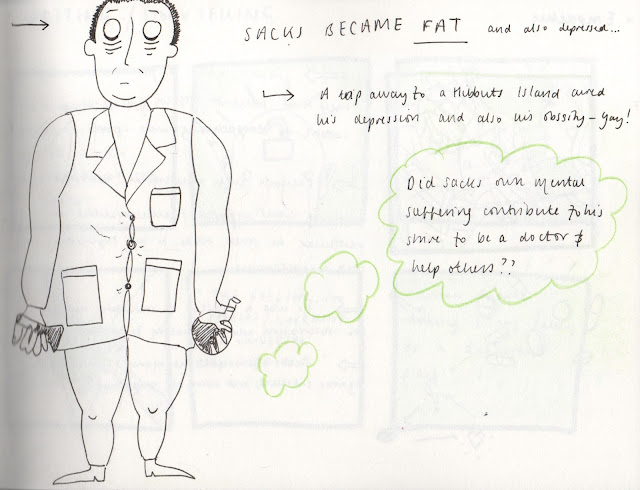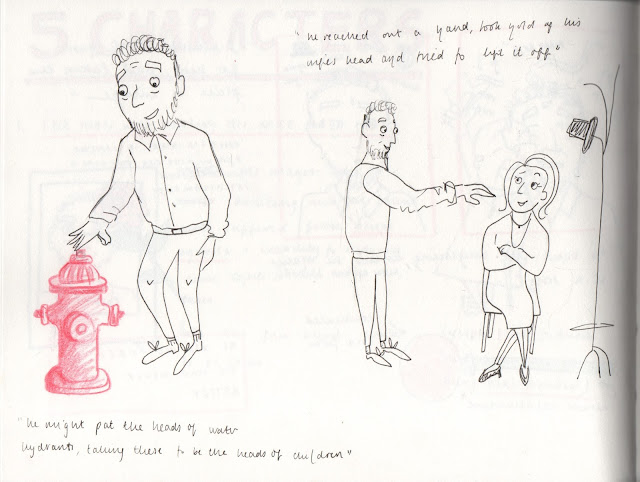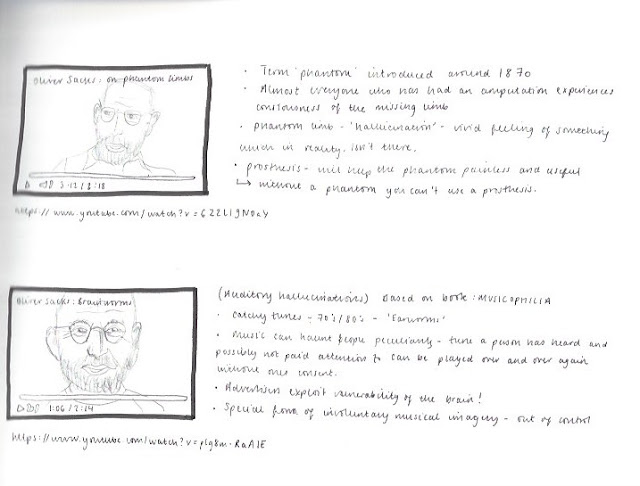5 Quotes/Selected pieces of writing
- "Music can lift us out of depression or move us to tears-it is a remedy, a tonic, orange juice for the ear"
- "I cannot pretend I am without fear. But my predominant feeling is one of gratitude. I have loved and been loved, I have been given much and I have given something in return. I have read and travelled and thought and written" (Sacks on his diagnosis)
- "Who cares if there was really any being to pray to? What mattered was the sense of giving thanks and praise, the feeling of a humble and grateful heart"
- "When people die they cannot be replaced. They leave holes that cannot be filled for it is the fate- the genetic and natural fate of every human being to be a unique individual, to find his own path, to live his own life, to die his own death."
- "First thing about being a patient- you have to learn patience"
5 Motifs
The human brain
With Sacks' specialism being in neurology, many years of his working life was devoted to studying and treating the human brain thus becoming the worlds most famous and sought after neurologist. As well as being a point of study, I admire the way that he analyses and assesses situations including the methods of aiding his patients with a neutral and intelligent response.
Empathy
One of the things that inspired me about Sacks' is his high level of conscientiousness regarding the care of his patients. Using his own experiences to empathise with his patients put them at ease, and made them feel more comfortable. 'He was a master at connecting curiosity to observation, and observation to emotion'
Writing and Storytelling
One of the things Sacks' is renown for is his outstanding gift for writing and telling stories, as evidenced in his many books including case studies of his patients and personal journeys. He would often lose track of time when writing, showing that he emphasised great value on learning, discovering and reflecting, for personal use and to educate others.
Extensive Knowledge/Skills
Sacks was an extremely well rounded individual. Having a lot of strings to his bow not only makes him interesting but allows him to share more experiences and tell more stories.
Devotion
It is clear that Sacks was extremely devoted to whichever task he set himself, or was given to him. Whether this be to find the cure for a patient, to pursue a personal goal or to find the answers to the mysterious and unknown.
5 Characters
Dr P: The man who mistook his wife for a hat
I connected with Dr P the most, as I saw his condition as being frustrating, yet he had such a positive outlook, allowing others to make light of his wayward actions and confusions. His musical talent was the ultimate solution to coping with his illness, as he couldn't do anything unless he made it a song or applied a rhythm to it; 'music has been the centre of your life, now make it the whole of your life'
All of the other patients I found interesting, but I didn't have the same level of interest/connection as and with Dr P.
The man who fell out of bed
Mrs S: Eyes Right
Mr Macgregor: On the level
- Parkinson's disease sufferer
- Nicknamed 'the human leaning tower of Pisa' as his body gradually tilted towards 20 degrees when he began to walk
- Metaphor: 'is there a sort of spirit level in the brain?'
Stephen D: The dog beneath the skin
- Medical student high on cocaine dreamt one night that he was a dog
- Everything that came with the dream stayed for a considerable amount of time.
- His senses were dramatically enhanced, to the extent where he saw the world in a completely different light; he was so inspired and cultivated by the things he saw and the things that he smelt
5 Locations
Israel
Where his depression was cured by partaking in manual labour (I am really interested in this!!) I find it remarkable how a change of scenery and purpose completely ridiculed is mind of the claustrophobic and sinister wrath that depression possesses.
Oxford University
A lot of people blossom in their place and their city of study. This is where Sacks' medical journey began. Having this solid foundation was the basis of his inspiration and was a catalyst to his initial successes.
Beth Abraham Hospital
Sacks worked here for a number of years. I am interested in the concept of growing and developing as a practitioner in the same place of work. Seeing people come and go, having many trials and tribulations as well as on a personal note, working his way to become the successful neurologist that he is so famously known for.
New York City
His place of settlement. Although originally from London. I personally see New York as the cliche place 'where dreams are made', but maybe this is just a universal mindset. Sacks seemed to excel here and find his feet; is this the case for everyone who chooses to settle in NY?
The Grand Canyon (cycling destination)
Sacks was a keen cyclist. He would often cycle from the University of California LA to the grand canyon! I wonder what was going through his mind whilst he was cycling all of those miles...
5 Pieces of information about the author
- Sacks suffered from prosopagnosia (face blindess) which affects his ability to recognise faces
- After finding out his poor result from his anatomy exam at uni, he drank his sorrows away in hard cider; whilst intoxicated he decided to compensate on his 'abysmal performance' in the previous exam by having a go at the Theodore William scholarship in anatomy. He only completed 1 out of 7 questions, he wrote for two hours solidly and proceeded to win! Question: Does structural differentiation imply functional differentiation?
- Sacks spent many weekends 'away' from reality, taking amphetamines such as lsd and weed. They helped him to sensitise with patients who had taken them too.
- He was gifted with the storytelling skills of a novelist/poet. He had a deeply personal, human empathy that wasn't often found in medical writing.
- Aged 22, to cure his depression he lived on a Kibbutz island partaking in manual labour as a 'cure'






















